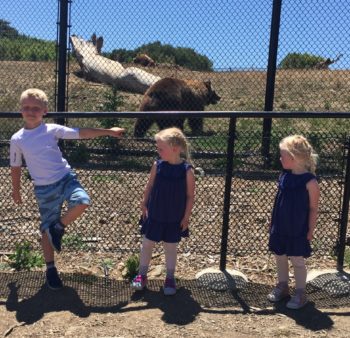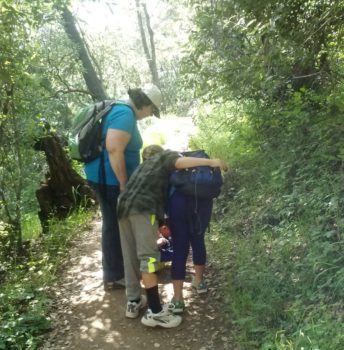Nurturing Our Kids’ Health and Spiritual Growth
 Nurturing Our Kids’ Health and Spiritual Growth
Nurturing Our Kids’ Health and Spiritual Growth
It is important to guide children in their healthy growth by helping them select a balanced diet of fruit, vegetables, grains, dairy products, and protein foods each day. Parents can model healthy meal preparations that can have a significant impact on children’s health, academic performance, and sense of well-being throughout life. Parents must take the time to ensure that their children have time for outside daily play for healthy growth and development. Children can play at parks and participate in afterschool sports, recreational activities, and performing arts activities.
Teaching Kids About Nutrition
From an early age, parents try and provide their children with a balanced diet. According to the United States Department of Agriculture, children should eat a variety of vegetables, fruits, grains, and protein plus a side order of dairy for breakfast, lunch, dinner, and for snacks. By using a plate for portion control, fruits and vegetables should take up half the plate while grains and protein each take up one fourth of the plate. Parents can encourage their children to plan and prepare nutritional meals by having them help when preparing a nutritional meal. They can:
- Organize the kitchen before cooking by wiping down counters, setting up a recycle bin, and placing recipe ingredients and utensils on the counter for a recipe.
- Assemble recipes and adjust the quantities of ingredients for a larger or smaller family.
- Pick vegetables and fruits from the family vegetable garden or a neighborhood community garden.
- Wash fruits and vegetables and slice them in salads and for cooking as a side dish.
- Help prepare meat for grilling, baking, or mixing into a recipe.
- Clean up the kitchen as the meal is prepared.
- Set the table while the meal is cooking.
- Clean up after dinner by washing the dishes, taking out the garbage, and recycling.
Training Kids as Meal Planners
As students enter middle school, they can shop and plan for nutritional meals while using a budget. High school students can prepare nutritional meals for the family one night a week.
Added heathy living includes sharing quality time with your children each day. Activities may include outside play, a family dinner, homework time, family recreational time, time for reading, and talking to individual children each night before they go to bed. Most children cherish these times to share their personal growth successes and fears. Some families share these successes and challenges during the family dinner each night as a daily check-in activity. Families can celebrate successes and help each other problem-solve challenging situations.
Nurturing Family Recreation and Physical Fitness Activities
Family recreation and physical activities can include park days, family hiking days, and cultural experiences. Families can plan mini getaways that include camping, hiking, bicycling, and nature explorations. Middle school and high school kids can plan the family’s annual vacation by:
- Researching various destinations while considering the costs for lodging, meals, and activities within a specified budget and timeline
- Reviewing travel options and selecting an option when considering the budget, driving requirements, and road maps to the destination
- Creating a schedule of daily activities that meets the needs of family members
Providing Moral and Spiritual Guidance
As children venture into the world of school, playdates, and community activities, they will meet children and families with different moral and ethical values. It is important that parents clarify their family values and help their children problem-solve when introduced to moral and ethical challenges. A family can identify their values by:
- Convening a family meeting to discuss expectations for daily life with each family member
- Having each family member share what they think are the important values for their family
- Making a list of what each family member has shared and voting on four values
- Creating a family symbol that artistically represents the four values that received the most votes
- Framing and displaying the family values symbol in a prominent location at home
Reinforcing Family Values
Families can review their list of values weekly at family meetings and when trying to decide on activities that the family will participate in that may reinforce these values. Families can consider adding or changing values over time. For example, families wanting to raise culturally sensitive children will encourage their children to invite friends from various cultures to their home for dinner. These families may participate in a cultural exchange program while their children attend high school and host a student from another country in their home for part of the school year. Spending quality time with grandparents and seniors can provide children with expanded exposure to different lifestyles, values, and activities.
Applying Family Values to Safety Concerns
As family members share their values, they can also discuss safety concerns regarding personal care, conflict resolution, sex, drug abuse, and alcohol use and abuse. Children can learn how to respond to situations that may not be safe. The chapter describes various case studies with worksheets on how family members might respond when exposed to challenging situations. For example, some families have a policy of having their children phone home for a ride if they feel uncomfortable at a party or a friend’s home. They can have an agreement that no questions will be asked when a child phones home for a ride to leave a party early.
Modeling Spiritual Growth through Community Services
Families can model spiritual growth and their love and care for others in need through church related activities, community service days, and school service-learning days. Community service and service-learning activities help children learn about different needs of families in their communities. Activities can include:
- Making cards and blankets for seniors
- Creating dog toys
- Collecting books, clothes, and toys for families in need
- Adopting a family or senior during the winter holidays
- Creating community garden decorations
May you treasure your shared healthy and spiritual growth activities with your family.
Mary Ann

 Book Recommendations for Middle Schoolers
Book Recommendations for Middle Schoolers How Our Kids Can Overcome COVID-19 Social Isolation
How Our Kids Can Overcome COVID-19 Social Isolation One Word Challenge
One Word Challenge